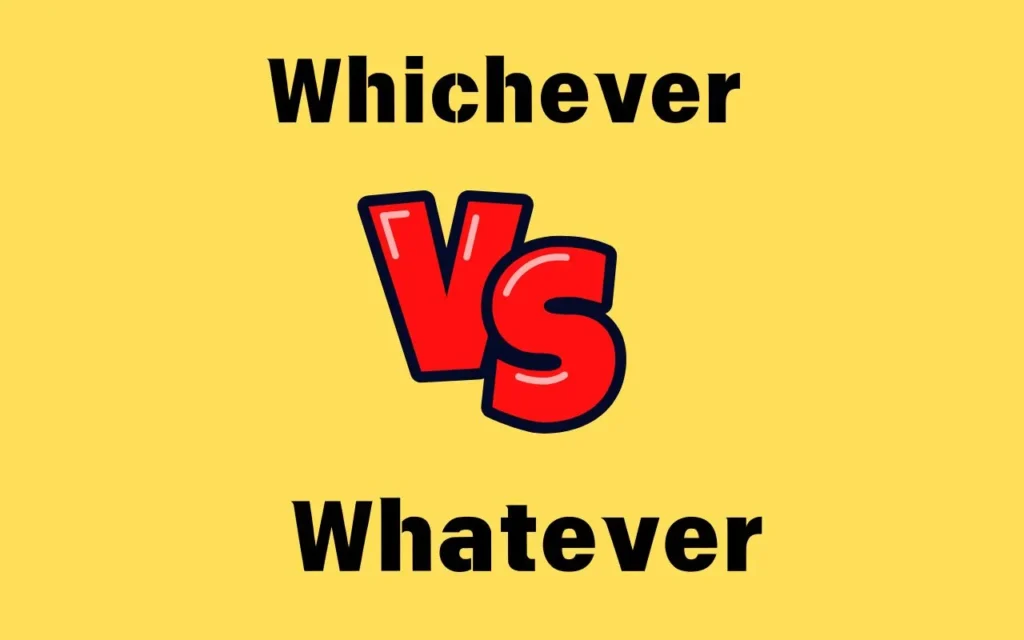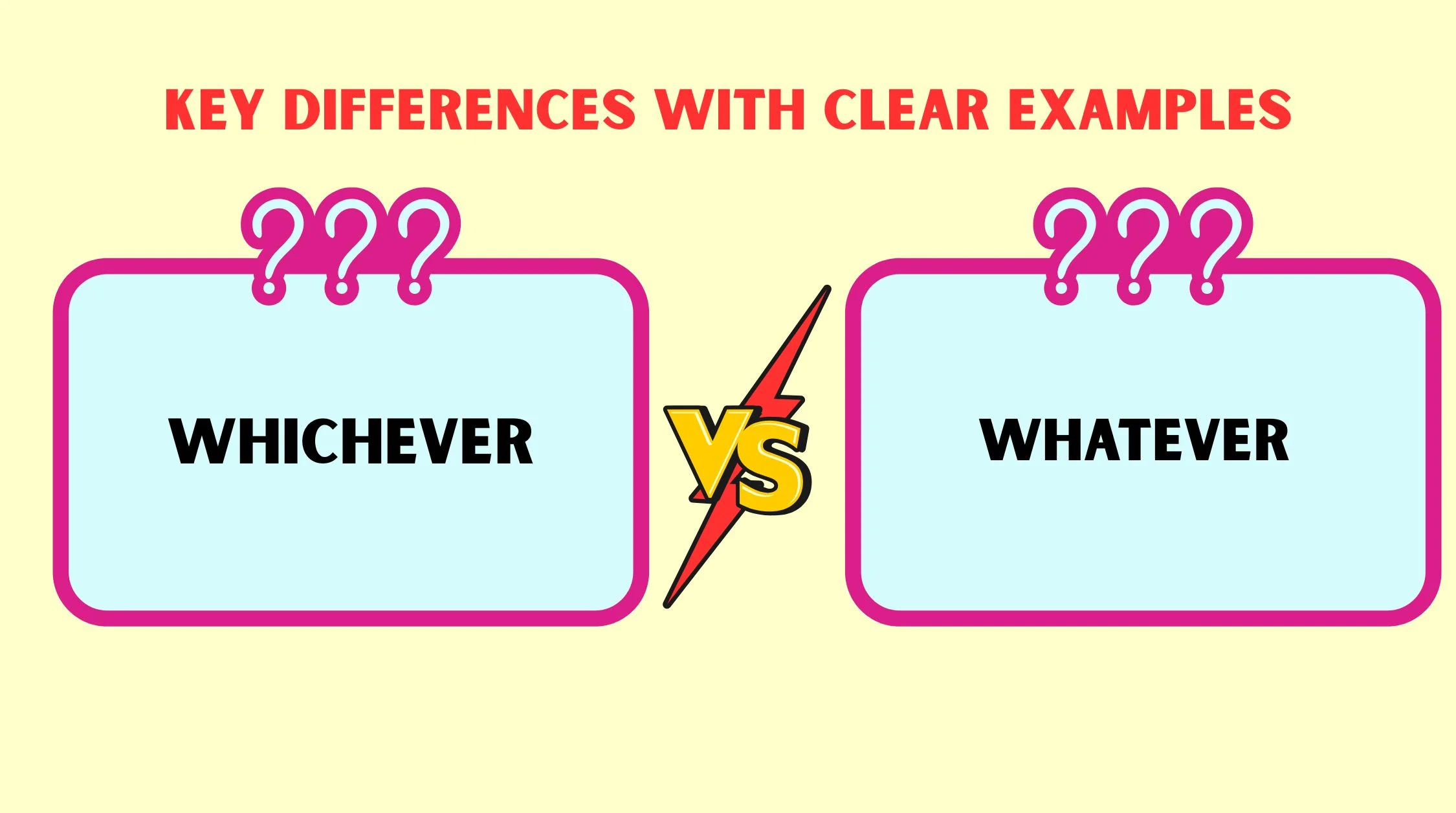Last updated on September 29th, 2025 at 10:49 am
English is full of words that look similar but carry different meanings depending on context. Two such words are whichever and whatever.
At first glance, they may appear interchangeable, but in reality, they serve distinct roles in grammar and communication.
If you’ve ever wondered whether to use whichever or whatever, this guide will clear up the confusion with detailed explanations, examples, and comparisons.
Introduction
You’ve probably heard both phrases:
- “Take whichever book you like.”
- “Take whatever book you like.”
At first, they look the same. Both suggest freedom of choice. But dig deeper, and you’ll notice a subtle difference: whichever usually refers to a choice from a defined set, while whatever suggests no limits or restrictions at all.
In this article, we’ll walk through grammar rules, real-world usage, common mistakes, and even a practice section so you’ll leave with a crystal-clear understanding of whichever vs. whatever.
Understanding the Basics of “Whichever” and “Whatever”

Both words belong to the family of compound words with “-ever”. This group also includes whoever, whenever, wherever, however. They act as pronouns or determiners, and sometimes introduce dependent clauses.
Here’s the quick breakdown:
- Whichever = from among a limited or specific set.
- Whatever = from an unlimited or unrestricted set.
Think of whichever as pointing at a basket with a few apples and saying, “Pick any one of these.”
Think of whatever as pointing at the entire orchard and saying, “Pick anything you want.”
Whichever – Detailed Explanation
Grammar Rules for “Whichever”
- Functions as a determiner: modifies a noun to show choice.
- Whichever option you choose, you’ll succeed.
- Functions as a pronoun: replaces the noun while still referring to a set of options.
- You may take whichever suits you best.
- Used in subordinate clauses:
- I’ll follow whichever path leads to success.
Usage Context
- Choosing among defined or limited options.
- Expressing conditionality or preference within a group.
- Suggesting flexibility, but only within a set boundary.
Examples of “Whichever” in Sentences
- Determiner: Choose whichever seat is free.
- Pronoun: You can select whichever fits your style.
- Clause: Whichever decision you make, I’ll support you.
Table: Examples of “Whichever”
| Sentence | Explanation |
|---|---|
| Take whichever road you prefer. | Choice from a fixed number of roads. |
| She’ll accept whichever proposal gets approved. | Restricted to submitted proposals. |
| Whichever player wins, the trophy stays in Europe. | Limited to the players in that game. |
Whatever – Detailed Explanation
Grammar Rules for “Whatever”
- Functions as a determiner: modifies nouns to show no restriction.
- Wear whatever clothes you like.
- Functions as a pronoun: refers broadly without boundaries.
- Do whatever makes you happy.
- Used in subordinate clauses:
- Whatever happens, keep smiling.
Usage Context
- Refers to unlimited or unknown options.
- Expresses indifference or lack of concern.
- Often used informally to dismiss something.
Examples of “Whatever” in Sentences
- Determiner: Choose whatever topic you want for your essay.
- Pronoun: Whatever you decide is fine with me.
- Clause: Whatever the reason, he refused to join.
Table: Examples of “Whatever”
| Sentence | Explanation |
|---|---|
| Eat whatever you find in the fridge. | Unlimited food choices. |
| Say whatever comes to your mind. | No restriction on words or thoughts. |
| Whatever mistakes you make, you’ll learn from them. | Covers all possible mistakes. |
Key Differences Between “Whichever” and “Whatever”
Although both indicate flexibility, they aren’t identical.
Comparison Chart
| Feature | Whichever | Whatever |
|---|---|---|
| Scope | Limited set of choices | Unlimited, unrestricted choices |
| Tone | Neutral, polite, specific | Broader, sometimes indifferent |
| Use Case | Defined situations (roads, seats, options) | Open-ended or all-encompassing |
| Example | Choose whichever book from the shelf. | Choose whatever book in the library. |
Side-by-Side Usage
- Take whichever pen from this box. (Box = limited set)
- Take whatever pen you find anywhere. (No restriction, any pen)
Related Words That Learners Confuse
The “-ever” family in English often creates confusion. Let’s break down a few:
Whoever
- Means any person who.
- Example: Whoever calls first will get the ticket.
Whenever
- Means at any time that.
- Example: Come whenever you like.
Wherever
- Means at any place that.
- Example: Sit wherever you want.
However
- Means in whatever way.
- Example: However you solve it, just get it done.
Why This Matters
Learners often assume these words are interchangeable. They’re not. Each combines a base word (who, when, where, how, which, what) with “-ever” to express openness or flexibility, but the scope differs.
Common Mistakes and How to Avoid Them
Mistake 1: Using whichever when no options are defined
❌ Take whichever you like (without showing options).
✅ Take whichever cookie from this plate.
Mistake 2: Overusing whatever in formal writing
❌ Submit whatever assignment you want.
✅ Submit any assignment from the list.
Mistake 3: Confusing tone in casual speech
- Whatever is often used dismissively. Example: “Yeah, whatever.”
- This is fine informally, but not in academic or professional contexts.
Quick Quiz / Practice Section
Try filling in the blanks with either whichever or whatever.
- ________ road you take, you’ll reach the city.
- Choose ________ movie you want to watch.
- I’ll support you in ________ choice you make.
- ________ student finishes first may leave early.
- Don’t eat ________ is in the bag; it might be spoiled.
Answer Key
- Whichever
- Whatever
- Whatever
- Whichever
- Whatever
Case Study: Real-Life Use in Speeches and Literature
Writers and speakers often rely on subtle word choice to shape meaning:
- Barack Obama, in his speeches, often used whichever to sound precise and inclusive, e.g., “Whichever path we take must be rooted in our values.”
- In contrast, Shakespeare used forms of whatever to heighten drama, e.g., “Whatever may happen, fortune favors the bold.”
This shows how the nuance between the two words can carry tone, intention, and emotional weight.
FAQs
What is the main difference between whichever and whatever?
Whichever refers to a choice from a limited set, while whatever refers to an unlimited or unrestricted choice.
Can I use whichever and whatever interchangeably?
No. They aren’t interchangeable. Whichever works with specific options, and whatever works with broader, open-ended choices.
Is whatever considered informal?
Yes, especially when used dismissively (e.g., “Yeah, whatever”). In formal writing, it’s better to use alternatives like any or all that.
When should I use whichever in a sentence?
Use whichever when choices are clear or limited. Example: Pick whichever chair you prefer from the row.
How is whatever used in daily conversation?
It often shows indifference, permission, or openness. Example: Do whatever you like.
What are other -ever words in English besides whichever and whatever?
Other common ones include whoever, whenever, wherever, and however, each adding flexibility to the base word.
Conclusion
The difference between whichever vs. whatever boils down to scope:
- Whichever = limited, defined set of options.
- Whatever = unlimited, unrestricted choice.
Both words are powerful tools for flexibility in English. By learning when to use each, you’ll avoid confusion, sound more natural, and express yourself with precision.
Final takeaway: Whichever is for specific choices. Whatever is for all choices.
So next time you face a decision, remember—your grammar depends on it.
